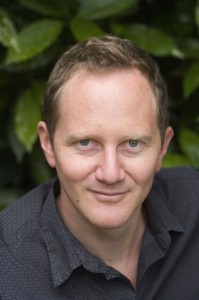 Chris Cleave is the author of INCENDIARY and the #1 New York Times bestseller LITTLE BEE. His third novel, GOLD will be published by Simon & Schuster on July 3. He lives with his wife and three children in Kingston-upon-Thames, England. Visit him at ChrisCleave.com or on Twitter @ChrisCleave.
Chris Cleave is the author of INCENDIARY and the #1 New York Times bestseller LITTLE BEE. His third novel, GOLD will be published by Simon & Schuster on July 3. He lives with his wife and three children in Kingston-upon-Thames, England. Visit him at ChrisCleave.com or on Twitter @ChrisCleave.
Becoming a father changed the way I write. Before the kids arrived I wrote stylistically rich, delicately nuanced, ethically engaged contemporary fiction with an eye to my eternal place in the literary pantheon. After the kids came, I wrote whatever I could on three hours’ sleep, assuming that no little people had been sick on my keyboard overnight. For a writer, the arrival of children is a direct hit below the waterline: much of the energy one previously spent comparing oneself to Joyce and Woolf is now spent baling out water while screaming frantic orders to the engine room: Left full rudder! In the name of God, beach this thing in the shallows before we all go down with it!
And yet I never wrote a story I honestly liked before I became a parent, and I haven’t written a story that I didn’t like since. Please don’t read arrogance into that statement: I’m not insisting that my work is good, I’m just saying that I like it.
I often wonder why the children’s arrival signalled such a radical shift in my writing style. From a technical point of view it’s hard to see what they bring to the party. I do my bit by working long hours to craft paragraphs of readable prose, while the kids do their bit by bringing viruses home from school. Nevertheless, they’ve made me a better writer.
Ever since the arrival of our firstborn, who is now eight years old, I’ve put children into my work. I haven’t been able to resist doing it. There is a greatness to children, a bigness of heart and a nobility of character that is buried a little deeper in us adults. Knowing this, we respond to children’s moral leadership. I don’t include kids in my novels because they’re cute, I put them in because they give an absolute counterpoint to the adult characters’ relativism.
Having said that, the children in my books and in my life are an excellent source of light relief. Sometimes I just need to take dictation. On being told “I love you” the other day, our three-year-old daughter pointed back and yelled “Not if I love you first!” I’d be surprised if that didn’t end up in my next novel.
Or take this nice picture that our six-year-old drew for me this week:
It’s a stylised rather than a strictly topographically accurate rendering of our immediate neighbourhood, featuring the iconic red British post box in the foreground, the fox that lives in our garden, the church with its spire and duck pond in which we see the warm sun reflected, and a row of five leafy trees. Such is our suburban idyll. On close inspection, though, the sixth tree in the row is bare and slanted. I asked the six-year-old about this. He said: “Oh, that’s not a tree, that’s a deer, and those are his antlers, and he’s just antlered that man in the blue tee-shirt to death, and there should be more blood but I lost my red crayon.”
(Eagle eyed observers will also have noted the black object in the sky, with its dorsal serrations and pendulous downward protrusion. Naïvely I had assumed this to be a storm cloud, captured in the act of dispensing a rain shower. What it is --- of course --- is an alien space ship with a death ray that will eliminate the whole of London in a fashion that will be both unbearably noisy and excruciatingly painful. This was so obvious that the six-year-old actually rolled his eyes while condescending to explain it to me).
I’ve often heard it said by writers that one’s novels are like one’s children. All I can say is that I’d hate to be those writers’ kids. Imagine being drafted and redrafted by a pathological control freak, then tussled over in a protracted custody battle with an editor, then sold into bonded servitude by an agent before being cloned and jammed into cardboard cartons with no air holes and dispersed to the four corners of the earth to meet the full spectrum of uncertain fates, including --- but not limited to --- remaindering and pulping. If you treated your kids like that, they’d be taken away from you. If you treat your novel like that, it actually is taken away from you --- and that’s considered to be quite the result. One doesn’t warn one’s novels against departing with persons unknown. Indeed, a certain proclivity for leaping headlong into the arms of strangers is a book’s whole raison d’être.
I like my three novels and I love my three children. There is a little of the latter in the former but I hope I would never get them confused. Father’s Day for me is a moment to remember how very different and how much better my life is since our children came into it. It’s the acknowledgement of an asymptote --- an omega point --- and so, to all my fellow dads celebrating this day, let me just wipe the baby spit off this keyboard and write: I salute you.


